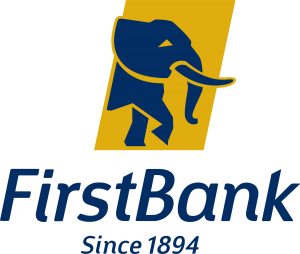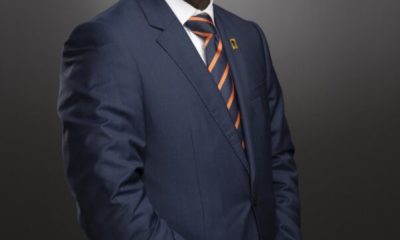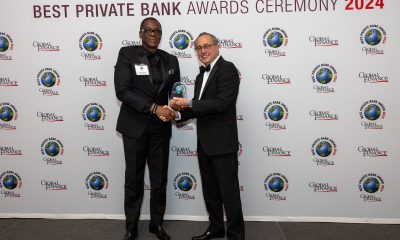Business
FIRSTBANK CELEBRATES YOUTH WEEK 2021

FIRSTBANK CELEBRATES YOUTH WEEK 2021
Global News Reports That FIRSTBANK CELEBRATES YOUTH WEEK 2021. From showcasing of talents, to the art of fashion design, identifying youths in the food business and lots more, Nigeria’s leading financial services providers, First Bank of Nigeria Limited has reiterated its commitment to Youth Empowerment and Entrepreneurship through the celebration of its ongoing 2021 Youth Week.
The Youth Week, themed “The Future is Now, Let’s Takeover” started on Monday, 8 November 2021. The event comprises a variety of activities, including: Youth themed Future Forward activities, First@arts Creative Artistry Empowerment Workshop, Grooming and Wellness Workshops, Digital Engagements, Virtual Mini Concert, and many more. Each activity is associated with various gift items, including gift vouchers and cash prizes.
During the celebration of the FirstBank Youth Week 2021, youths will get rewarded for their talents by following this process – Do a recording showcasing your singing prowess in a video (1 minute or less), Upload your video on Instagram, be sure to follow firstbanknigeria on IG, then Tag 5 friends to follow the bank with the hashtags #YouthVoices #FirstBank #YouthWeek. The top 5 videos with the highest likes will be posted on FirstBank page and the top 3 videos with the highest likes would win the competition. In addition, Millennials and Gen Zs will upload videos detailing their FirstBank experience on Yammer. The videos with the most votes will win the 1st, 2nd and 3rd prizes respectively.
The Bank will also provide an avenue for the youth to be empowered in Artistry Workshop Sessions & Arts Classes. A call for interested candidates in the art of fashion design and illustrations will be done. Entries will be received from candidates who are told to submit their illustration creatives and 10 Youths will be empowered to learn the business of illustrations at Claire Idera Studio.
Also included is the Food Grill & Fest, a platform the FirstBank uses to give opportunities to youths in the Food business. Youths in the food business will be allowed to submit their entries to the vendors at the Grill & Fest 2021. Food related questions will be asked on the Bank’s verified social media platforms and the first 5 people to get the questions right will win vouchers. The Wellness and Grooming 101 event will provide an avenue for youths to be empowered in grooming and wellness Masterclass. Interested youths will show their interest to upskill in areas of beauty, grooming and wellness.
Speaking on the Youth week celebration, Dr. Adesola Adeduntan, Chief Executive Officer of FirstBank said ‘’we remain committed to recognizing the enormous opportunities that can empower the Nigerian youth. Over the years, we have seen our youth benefit from actively engaging in our programmes where they develop effective leadership skills and gain a stronger connection to their community. Young people are our future and we are always ready to support and help harness their skills as with these, we put them at an advantage in securing their future as they contribute to national development.
At FirstBank, with about 57% of the entire workforce being millennials and ‘Gen Zs’, the Youth segment has been and will continue to be the prime focus. Therefore, the Youth Week presents a unique platform to strengthen the Banks commitment to the younger population, who have become the powerhouse driving all facets of digitization and innovation in our world today’’.
Since 1999, Nigeria has continued to join the international community to observe the Day in commemoration of the importance of youth’s participation in politics, economic and social activities towards a sustainable development of the nation. Nigeria has one of the highest populations of youth in the world, with about half of the estimated 200 million of the country’s total population being under the age of 19 and 62%, below the age of 24.
For more information and participation in the Youth Week, kindly visit the bank’s verified social media platforms; Instagram: @firstbanknigeria, Facebook: First Bank of Nigeria Limited.
Business
Nigeria’s Inflation Drops to 15.10% as NBS Reports Deflationary Trend

Nigeria’s headline inflation rate declined to 15.10 per cent in January 2026, marking a significant drop from 27.61 per cent recorded in January 2025, according to the latest Consumer Price Index (CPI) report released by the National Bureau of Statistics.
The report also showed that month-on-month inflation recorded a deflationary trend of –2.88 per cent, representing a 3.42 percentage-point decrease compared to December 2025. Analysts say the development signals easing price pressures across key sectors of the economy.
Food inflation stood at 8.89 per cent year-on-year, down from 29.63 per cent in January 2025. On a month-on-month basis, food prices declined by 6.02 per cent, reflecting lower costs in several staple commodities.
The data suggests a sustained downward trajectory in inflation over the past 12 months, pointing to improving macroeconomic stability.
The administration of President Bola Ahmed Tinubu has consistently attributed recent economic adjustments to ongoing fiscal and monetary reforms aimed at stabilising prices, boosting agricultural output, and strengthening domestic supply chains.
Economic analysts note that while the latest figures indicate progress, sustaining the downward trend will depend on continued policy discipline, exchange rate stability, and improvements in food production and distribution.
The January report provides one of the clearest indications yet that inflationary pressures, which surged in early 2025, may be moderating.
Bank
Alpha Morgan to Host 19th Economic Review Webinar

Alpha Morgan to Host 19th Economic Review Webinar
In an economy shaped by constant shifts, the edge often belongs to those with the right information.
On Wednesday, February 25, 2026, Alpha Morgan Bank will host the 19th edition of its Economic Review Webinar, a high-level thought leadership session designed to equip businesses, investors, and individuals with timely financial and economic insight.
The session, which will hold live on Zoom at 10:00am WAT and will feature economist Bismarck Rewane, who will examine the key signals influencing Nigeria’s economic direction in 2026, including policy trends, market movements, and global developments shaping the local landscape.
With a consistent track record of delivering clarity in uncertain times, the Alpha Morgan Economic Review continues to provide practical context for decision-making in a dynamic environment.
Registration for the 19th Alpha Morgan Economic Review is free and can be completed via https://bit.ly/registeramerseries19
It is a bi-monthly platform that is open to the public and is held virtually.
Visit www.alphamorganbank to know more.
Business
GTBank Launches Quick Airtime Loan at 2.95%

GTBank Launches Quick Airtime Loan at 2.95%
Guaranty Trust Bank Ltd (GTBank), the flagship banking franchise of GTCO Plc, Africa’s leading financial services group, today announced the launch of Quick Airtime Loan, an innovative digital solution that gives customers instant access to airtime when they run out of call credit and have limited funds in their bank accounts, ensuring customers can stay connected when it matters most.
In today’s always-on world, running out of airtime is more than a minor inconvenience. It can mean missed opportunities, disrupted plans, and lost connections, often at the very moment when funds are tight, and options are limited. Quick Airtime Loan was created to solve this problem, offering customers instant access to airtime on credit, directly from their bank. With Quick Airtime Loan, eligible GTBank customers can access from ₦100 and up to ₦10,000 by dialing *737*90#. Available across all major mobile networks in Nigeria, the service will soon expand to include data loans, further strengthening its proposition as a reliable on-demand platform.
For years, the airtime credit market has been dominated by Telcos, where charges for this service are at 15%. GTBank is now changing the narrative by offering a customer-centric, bank-led digital alternative priced at 2.95%. Built on transparency, convenience and affordability, Quick Airtime Loan has the potential to broaden access to airtime, deliver meaningful cost savings for millions of Nigerians, and redefine how financial services show up in everyday life, not just in banking moments.
Commenting on the product launch, Miriam Olusanya, Managing Director of Guaranty Trust Bank Ltd, said: “Quick Airtime Loan reflects GTBank’s continued focus on delivering digital solutions that are relevant, accessible, and built around real customer needs. The solution underscores the power of a connected financial ecosystem, combining GTBank’s digital reach and lending expertise with the capabilities of HabariPay to deliver a smooth, end-to-end experience. By leveraging unique strengths across the Group, we are able to accelerate innovation, strengthen execution, and deliver a more integrated customer experience across all our service channels.”
Importantly, Quick Airtime Loan highlights GTCO’s evolution as a fully diversified financial services group. Leveraging HabariPay’s Squad, the solution reinforces the Group’s ecosystem proposition by bringing together banking, payment technology, and digital channels to deliver intuitive, one-stop experiences for customers.
With this new product launch, Guaranty Trust Bank is extending its legacy of pioneering digital-first solutions that have redefined customer access to financial services across the industry, building on the proven strength of its widely adopted QuickCredit offering and the convenience of the Bank’s iconic *737# USSD Banking platform.
About Guaranty Trust Bank
Guaranty Trust Bank (GTBank) is the flagship banking franchise of GTCO Plc, a leading financial services group with a strong presence across Africa and the United Kingdom. The Bank is widely recognized for its leadership in digital banking, customer experience, and innovative financial solutions that deliver value to individuals, businesses, and communities.
About HabariPay
HabariPay is the payments fintech subsidiary of GTCO Plc, focused on enabling fast, secure, and accessible digital payments for individuals and businesses. By integrating payments and digital technology, HabariPay supports innovative services that make everyday financial interactions simpler and more seamless.
Enquiries:
GTCO
Group Corporate Communication
[email protected]
+234-1-2715227
www.gtcoplc.com
-

 celebrity radar - gossips6 months ago
celebrity radar - gossips6 months agoWhy Babangida’s Hilltop Home Became Nigeria’s Political “Mecca”
-

 society6 months ago
society6 months agoPower is a Loan, Not a Possession: The Sacred Duty of Planting People
-

 society5 months ago
society5 months agoReligion: Africa’s Oldest Weapon of Enslavement and the Forgotten Truth
-

 news6 months ago
news6 months agoTHE APPOINTMENT OF WASIU AYINDE BY THE FEDERAL GOVERNMENT AS AN AMBASSADOR SOUNDS EMBARRASSING










